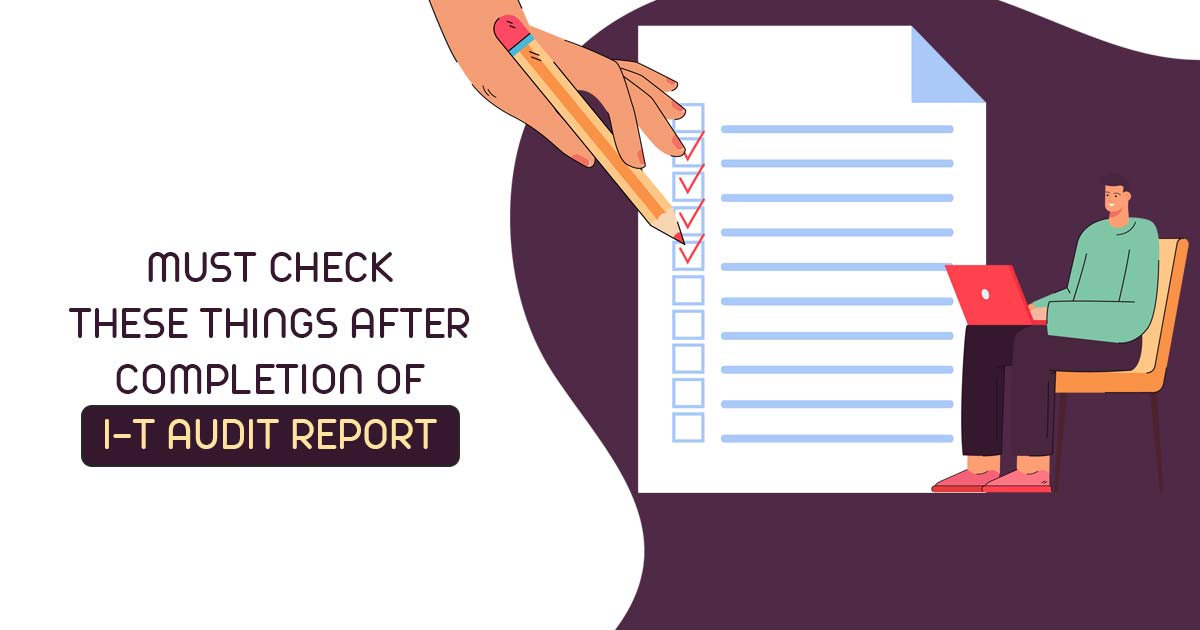
After the completion of an income tax audit, it’s essential for individuals to verify certain aspects to ensure the accuracy of the audit report. This verification is crucial to prevent potential penalties imposed by the income tax department due to inaccuracies in the report.
Additionally, rectifying any errors may necessitate rehiring an auditor for a reevaluation. Stated below are the important things that you should verify post-submission of the Income-tax audit report by your tax auditor.
Verification of Correct ITR Forms
Taxpayers subject to mandatory tax audits should confirm that their auditor has submitted the appropriate forms as required by tax regulations. Auditors are obligated to provide a report using Form 3CB, along with comprehensive details comprising 44 clauses in Form 3CD, for income tax audit purposes.
However, if the taxpayer’s books require auditing under another law (such as the Companies Act, 2013), the auditor will furnish a report using Form 3CA, along with detailed particulars in Form 3CD.
Essentially, Form 3CD serves as a universal form for all individuals obligated to comply with income tax audits, with the use of Form 3CA or Form 3CB depending on the taxpayer’s category.
Therefore, a person should verify that the tax auditor has provided the appropriate audit forms.
The chartered accountant who performed the audit will use a digital signature certificate (DSC) to sign the audit report and provide information about the audit company, including its name, registration number, PAN, and UDIN.
Important: Easy Way to View Company Auditor Report by Gen Bal Software
The Institute of Chartered Accountants of India (ICAI) website must be used to generate the UDIN number, which must then be entered into the audit report.
An individual can verify the legitimacy and veracity of the CA who carried out the tax audit using the UDIN number. This reduces the likelihood of forging signatures on papers by individuals impersonating CA in order to deceive authorities.
Time Period to Upload Income Tax Audit Report
The tax auditor must complete the upload of the audit report no later than 31st October 2025. Failure to do so will result in a penalty being imposed. This penalty amounts to either 0.5% of the total sales, turnover, or gross receipts (whichever is applicable) or a maximum of Rs 1,50,000, depending on which is lower.
The individual who was responsible for the tax audit will be subject to this penalty. To facilitate this process, the income tax auditor will utilise their account on the ITR portal, associating it with the Permanent Account Number (PAN) of the individual requiring the audit.
To accomplish this, individuals need to include the tax auditor as their Chartered Accountant (CA) in their ITR profile on the tax department’s e-filing portal. Once this step is completed, the tax auditor gains the capability to upload the audit report.
After the upload, the individual has the option to either accept or reject the report. It’s important to note that the tax audit must be accepted by the individual on or before 31st October 2025, before the due date.
Once the tax audit report is uploaded, it will be accessible for preview through the individual’s ITR portal account. Typically, individuals will receive SMS and email notifications informing them of the submission of the tax audit report.
It is advisable for the individual to regularly access their e-filing ITR portal or, at the very least, monitor their SMS and email inbox for notifications regarding the uploaded audit report linked to their PAN.
Thorough Document Verification and Disclosure
Individuals should meticulously review the key elements of the tax audit report. These details provide insight into whether the auditor has identified any concerning issues related to business operations and income generation.
Read Also: 4 Issues May Occur After Increasing Tax Audit Limit U/S 44AB
A tax expert can provide guidance on some of the notable elements within the tax audit report that individuals should pay attention to:
- Verify the auditor’s view on the fairness of the financial statements and a list of any observations they may have made.
- Confirm that the auditor has examined all pertinent records and ledgers, including vouchers, cash ledgers, buy and sales ledgers, etc.
- Check to determine if the auditor has disclosed all pertinent information, including related party transactions, depreciation, prior period revenue and expense, etc.
- In addition, check to see if the auditor has offered concise justifications or justifications for any key findings, inconsistencies, exclusions, or other things.
Accurate Information in the Income Tax Audit Report
The primary responsibility for ensuring the accuracy of information in the tax audit report rests with the tax auditor. If the tax auditor includes any incorrect details in the tax audit report, it does not directly affect the individual.
However, the individual is accountable for maintaining their books of accounts accurately. If the tax authorities detect any false entries or omissions in the individual’s records, it can lead to various actions, such as rejecting the books of accounts, conducting an income assessment or reassessment, and imposing penalties and interest.
Also Read: How to Prepare a Balance Sheet Via Genius Tax Software
Under income tax laws, a penalty is imposed on the tax auditor if they provide inaccurate information in the reports or certificates. Income tax Section 271J prescribes a penalty of Rs 10,000 for each report or certificate containing erroneous information.
Importantly, the burden of proof regarding the auditor’s mistake lies with the individual. Failure to demonstrate the auditor’s error will result in the penalty being imposed on the individual.